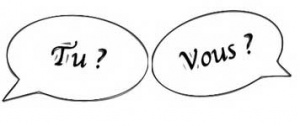Difference between revisions of "Language/French/Grammar/Polite-Form"
Jump to navigation
Jump to search
| Line 2: | Line 2: | ||
See translation of this page in Arabic: https://polyglotclub.com/wiki/Language/French/Grammar/Polite-Form/ar | See translation of this page in Arabic: https://polyglotclub.com/wiki/Language/French/Grammar/Polite-Form/ar | ||
for a more complete lesson, go here: https://polyglotclub.com/wiki/Language/French/Grammar/Vous-and-Tu-Complete-Guide | |||
Revision as of 20:06, 17 May 2021
See translation of this page in Arabic: https://polyglotclub.com/wiki/Language/French/Grammar/Polite-Form/ar for a more complete lesson, go here: https://polyglotclub.com/wiki/Language/French/Grammar/Vous-and-Tu-Complete-Guide
Let's talk about the use of "tu" and "vous" in French.
The words "tu" and "vous" both mean you. Which word for you is used depends on the person being addressed.
- "tu" is used with family, friends or among young people. In other cases it can be considered rude.
- "vous" is used with the persons you do not know or to whom you have respect like your teacher, your boss or a person older than you.
So beware, if you do not know the person, it is best to always use "vous" in French.
Tu
- Tu vas bien Étienne ? (How do you do, Etienne?)
- Oui, ça va et toi Franck? (Well, and you Franck?)
- Tu connais cette fille? (Do you know that girl?)
Vous
- Bonjour Monsieur, vous allez bien ? (Good morning sir, how are you?)
- Très bien Madame, merci ! (Very well, madam, thank you!)
VIDEOS
Please edit this page to improve it!
